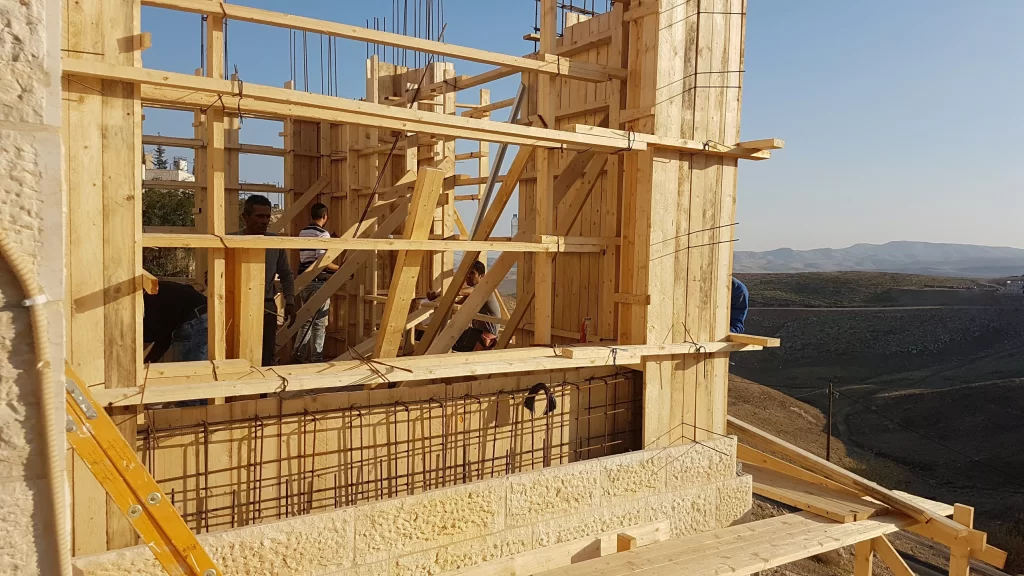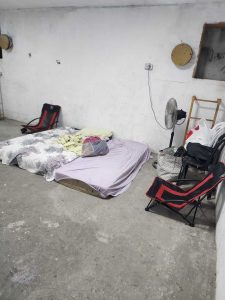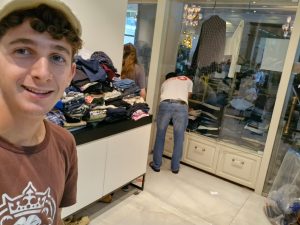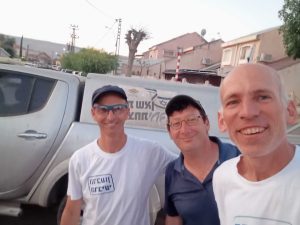“Zalman – Can we have a brief conversation?” Magdi, with his above-average Hebrew and a distinct Arabic accent, called out to me from behind the scaffolding. There was a subtle change in his tone that immediately caught my attention, a departure from the usual small talk we’d engaged in over the past couple of weeks.
We had entrusted Sleman, known as Abu-Magdi in Arabic and Magdi’s father, to oversee a long-anticipated project: enclosing the spacious porch attached to our living room and creating a much-needed communal space in our home. Each morning, Sleman, the leader of the construction crew, along with his son Magdi and other workers, most of whom were members of their extended family or Hamula, arrived at our home to carry out the construction work. They were Palestinians and Muslims hailing from the village of Rantis, not far from the security barrier and an Israeli checkpoint.
To allow them to work within our premises, we had to obtain a security permit from the Israeli Administration in the West Bank. Additionally, an armed guard had to accompany them throughout their time in our community. These requirements didn’t pose a problem for us; we were delighted to have them working on our home. As we progressed with the business aspects of the project and construction got underway, opportunities for casual conversations and friendship began to emerge.
Magdi and I engaged in numerous discussions, swiftly getting to know each other and sharing insights about our respective families. We exchanged stories from our life experiences, discussed our hobbies, and swapped gifts – he brought items from his village, and we provided him with clothes that our little girl had outgrown, which conveniently suited his daughter.
Numerous cups of black coffee and tea were shared, and it’s safe to say that we had truly formed a friendship. Yet, we were acutely aware that our friendship had its boundaries and constraints. You see, Magdi and the other workers had been granted permits to work within our home, and once their job was completed, these permits would expire. Regrettably, there was no provision for a friendship permit, one that would enable a Palestinian and an Israeli Jewish citizen to invite each other over for a cup of coffee at their respective homes. The extent of our interactions was mostly limited to meetings at a gas station along one of the shared roads in Area C, under the jurisdiction of the Israeli civil and security administration, or in one of the local parks or hiking trails. Our dreams occasionally veered towards uniting both our families for a day of hiking in Wadi Qelt.
As time passed, we found ourselves gradually delving into more profound conversations, including discussions about politics and religion. Among the handful of workers, Magdi was the most devout, never missing a prayer, even if it meant doing so at the construction site or in our rather dusty living room. Magdi was deeply intrigued by the fact that I had studied a university course on the Islamic religion and had a Hebrew translation of the Quran at home. Our shared curiosity and mutual respect added an extra layer of fascination and meaning to our relationship and conversations.
Sleman, on the other hand, was a man of few words, always focused on the task at hand. He believed excessive talking could hinder productivity, leading to prolonged workdays and reduced profits. So when Sleman said, “Zalman, we need to discuss something,” I instinctively sensed it might not be a favorable conversation. It usually meant there was an issue with the project plan, a deviation from the timetable, concerns with suppliers, or perhaps a financial matter. That’s why when Magdi approached me in such a serious and formal manner, it immediately put me on edge.
“Hey, Magdi, what’s on your mind? You seem a bit tense,” I inquired. Magdi’s response was concise: “Brew some black coffee; I’m coming in.” As we sat down, he began to speak. “Today, I went inside to pray,” he started, and without hesitation, I reassured him, “That’s absolutely fine, we don’t mind.” He went on, “I was in the corner, and your wife walked right in front of me.” At this point, I couldn’t anticipate where he was heading with this. “This isn’t ideal, and after I finished praying, I spoke to her about it.” Swiftly, I interjected, “Magdi, I’m certain she had no intention of causing any discomfort, and it wasn’t a sign of disrespect. I’ll talk to her, and it won’t happen again.” Magdi promptly responded, “I understand, and my intention was not to show disrespect either. I merely hoped to bring it to her attention so that she might avoid it in the future.” “Of course, of course,” I reassured him, “everything’s alright, no need to worry.”
Many years have come and gone, and every now and then, Majdi reaches out to me with a text or a call, mostly to exchange pleasantries and inquire if there are any job opportunities for his team in our community. His most frequent words are, “We truly enjoyed working with you and in your community; please spread the word about us.” I unfailingly respond with, “Of course, of course.” Every so often, our shared dream of meeting at a nature park and spending time together resurfaces, but the busyness of life often postpones that plan, with the promise that one day we will make it happen.
Respect is a profoundly significant value, and it is closely tied to culture. You can request or even expect respect, but there’s no guarantee you will receive it. On the other hand, showing respect and ensuring that we don’t disrespect others is entirely within our control. No one can compel us to do it; it’s a choice we make. But what transpires when we encounter cultural differences? Can we realistically be expected to understand all the nuances of respect codes? I don’t believe so. Sensitivity and curiosity can certainly help, but they may not always be readily available. People, even the most perceptive ones, make mistakes. The true test lies in the aftermath. Do you have the courage to open your heart, initiate a conversation, educate one another, and extend forgiveness with respect? I’m confident that this approach minimizes the likelihood of a repeat occurrence.
I learned this invaluable lesson in my rather dusty living room, courtesy of my Muslim-Palestinian friend and contractor, Majdi, who continued to pray in our home, and we, in turn, refrained from walking in front of him.




